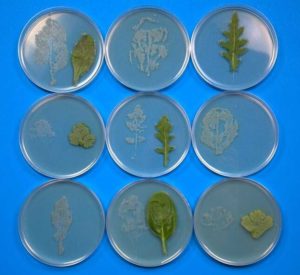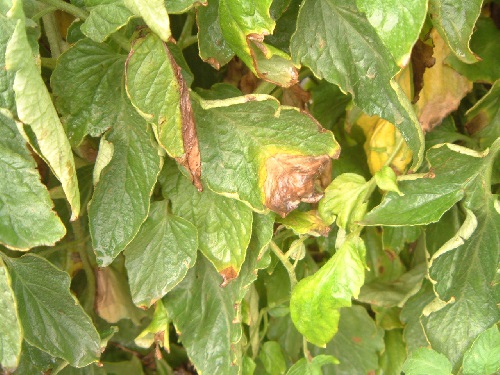New Study Shows Pre-Cut Salad Fosters Growth Of Salmonella

This image highlights salad leaf microflora prints. Photo credit: The University of Leicester
A new study from the University of Leicester in England shows that small amounts of damage to salad leaves in bagged salads encourage the presence of Salmonella enterica. Juices released from damaged leaves also enhance the pathogen’s ability to attach to the salad’s plastic container. The research was published Nov. 18 in Applied and Environmental Microbiology, a journal of the American Society for Microbiology.
In the study, salad juices in water — to mimic the grocery salad bag environment — more than doubled movement of individual Salmonella bacteria, abetting salad leaf colonization. In the course of a typical five-day refrigeration storage time, around 100 Salmonella bacteria multiplied to approximately 100,000 individual bacteria. Salad juices also boosted formation of biofilms on salad leaves. Microbial biofilms generally cling tenaciously to the surfaces they coat — medical implants, stainless steel, or one’s teeth, in the form of dental plaque — and Salmonella biofilms on salad leaves are no exception. They are powerfully resistant to being washed off.
Yet surprisingly, the normal microbial flora on salad leaves did not respond to leaf juices, suggesting that the leaf juices give Salmonella a marked advantage in colonizing salad leaves as compared to competing bacteria, according to the report. [image: salad leaf microflora prints. credit: The University of Leicester]
Salad leaf crops are usually grown in open fields where they can be exposed to Salmonella, via insects and manure, among other sources. While outbreaks of Salmonellosis due to such contamination are uncommon, they are nonetheless a public health problem. Such outbreaks may occur despite practices used to mitigate the problem, such as irrigation with clean water, good hygiene, leaf washing, and the like, said coauthor Primrose Freestone, PhD, Associate Professor in Clinical Microbiology, University of Leicester, United Kingdom. In fact, salad leaves can acquire Salmonella from recycled wash water, she says.
Moreover, earlier studies have shown that Salmonella are so powerfully attracted to salad leaf and root juices that they can find their way into the plant vasculature during the salad plant’s germination, and once inside, there is no way to wash them out, Freestone says.
Salmonella grows especially well on spinach, Freestone says. “”It seems the pathogen prefers spinach.”
Pre-prepared salads are sold increasingly commonly in grocery stores, Freestone says. They also appear in fast food and in airline meals. However, few studies had previously investigated the behavior of Salmonella within ready-to-eat bagged salad, she says. “We wanted to investigate what happens to Salmonella in a bag of salad to better understand the potential risks to consumers and inform future research on reducing attachment of this pathogen to salad leaves. This study is part of our ongoing research into ways to reduce the risk of Salmonella persisting and growing when it is present in bagged salad.”
The research was funded in part by a Biotechnology and Biological Sciences Research Council i-case Studentship for PhD student Giannis Koukkidis.










